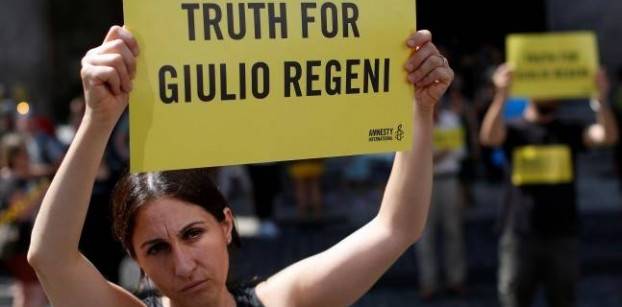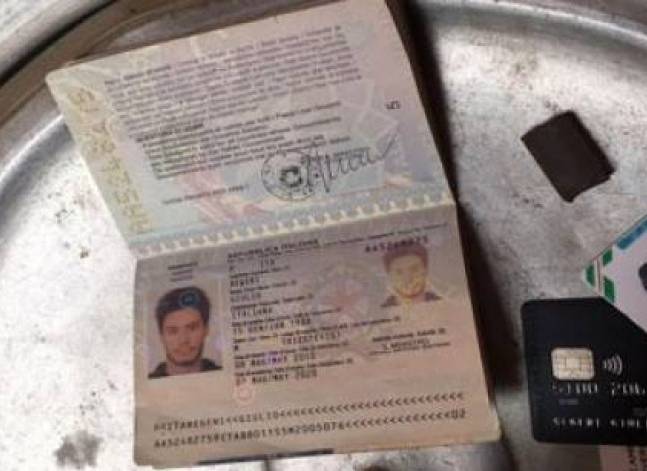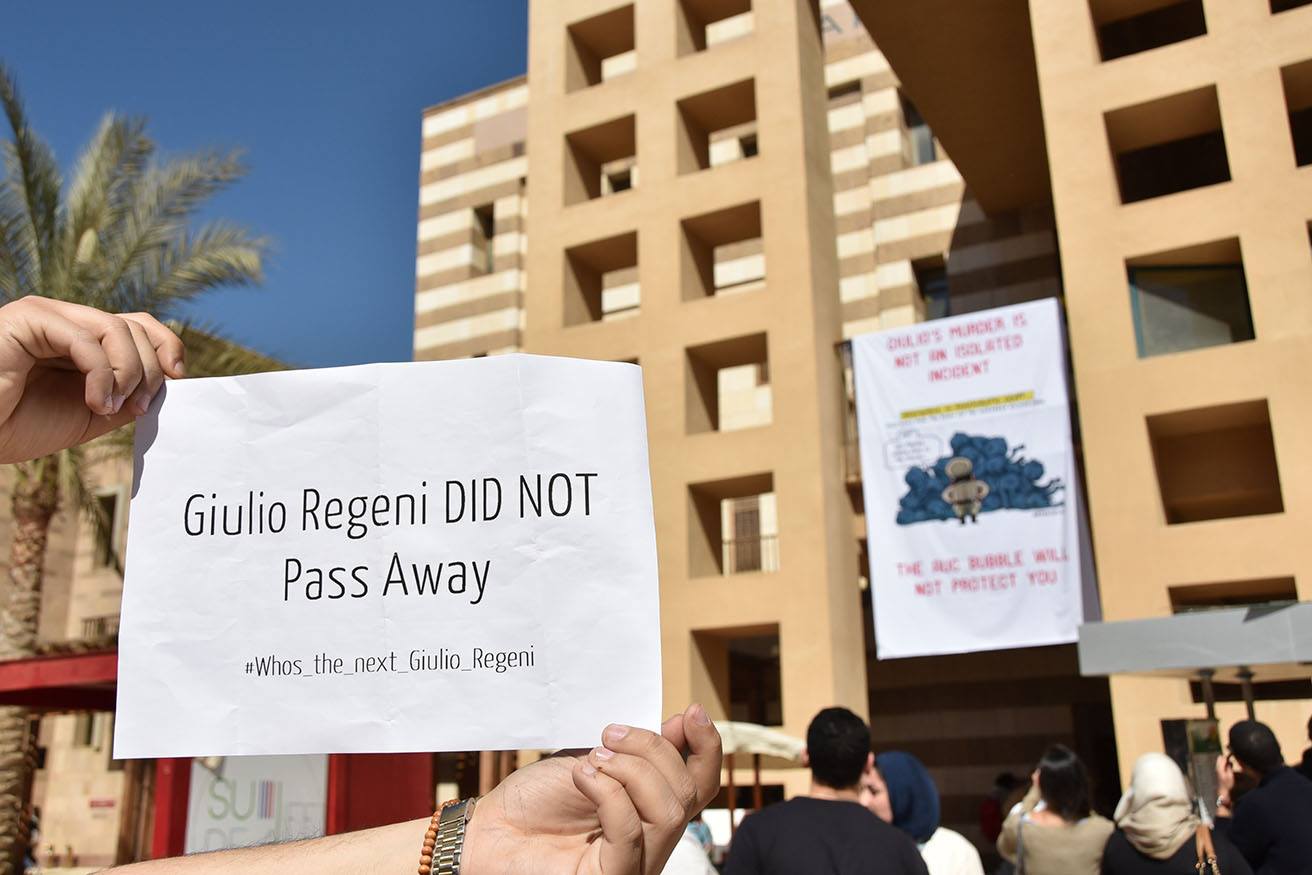Latest NEWS
- Aswat Masriya, the last word
- Roundup of Egypt's press headlines on March 15, 2017
- Roundup of Egypt's press headlines on March 14, 2017
- Former Egyptian President Hosni Mubarak to be released: lawyer
- Roundup of Egypt's press headlines on March 13, 2017
- Egypt's capital set to grow by half a million in 2017
- Egypt's wheat reserves to double with start of harvest -supply min
- Roundup of Egypt's press headlines on March 12, 2017
Special Report: In Egypt, an Italian student stirred suspicion before he died
CAMBRIDGE, England (Reuters) - Ten days before he vanished, Italian doctoral student Giulio Regeni made a Skype call from his Cairo flat to an academic in Germany.
It was the middle of January and Egyptian police were braced for political protests ahead of the fifth anniversary of the 2011 uprising that toppled long-time autocrat Hosni Mubarak.
Regeni sounded anxious.
"We did not talk very much as it was expected that we will catch up at some point later," said Georgeta Auktor, a researcher at the German Development Institute in Bonn, where Regeni had spent a few weeks in 2015.
"He said he feels he needs to be careful where he goes in the city and whom he meets."
They did not speak again.
Regeni's body was found on the side of the Cairo-Alexandria highway on Feb. 3 by passengers on a bus that had broken down, according to a police source. Egyptian forensics officials said the body showed signs of torture, including cigarette burns and beatings.
Regeni's mother, Paola, later told Italy's parliament that her son's injuries were so bad she identified him only by the tip of his nose. Egyptian human rights groups said the torture suggested Egyptian security services had killed the student, allegations those services and the government have strongly denied.
In April, intelligence and security sources told Reuters that police had arrested Regeni outside a Cairo metro station on Jan. 25 and then transferred him to a compound run by Homeland Security. The government and security services deny he was ever in custody.
It remains unclear who killed Regeni or why. But piecing together his activity in the months leading up to his death, it is apparent that two factors put the student at risk: his passionate interest in political and economic issues and his belief that Egypt needed change. Three Egyptian security sources have told Reuters that Regeni raised the suspicions of Egypt's security services because he met unionists and was researching politically sensitive subjects.
"Homeland Security had monitored Regeni with a number of opposition leaders and labor unions. He attended several meetings," one of the sources said.
A second security source said: "He is a foreigner and does not work in the media ... and this is what made Homeland Security follow and monitor him."
A third security source said that Regeni's meetings were suspicious because they took place at "a time in which many nations were intervening in what is happening in Egypt." This, he said, raised the possibility that the Italian was gathering information for a foreign nation.
But other Egyptian security officials said that even if agents were watching Regeni's activities they played no role in his death.
Two Egyptian officials – one in security, one in government – said that if security services had suspected Regeni was a spy he would simply have been deported.
A Western ambassador said that may have been true in the past, but no longer. "That is what happened in the Cold War. This is Egypt under Sisi. They are very suspicious," he said, referring to Abdel Fattah al-Sisi, the army general who is now Egypt's president.
Reuters has also learned that a personal disagreement may have fueled the official suspicion. The leader of one union said that another union figure likely talked to the police about Regeni after the Italian refused to buy the second man a mobile phone and overseas flights.
Regeni, who was 28, had been researching Egypt's independent unions for his doctoral thesis. Associates say he was also interested in alternatives to the long-standing domination by the state and the military of Egypt's economy.
Both subjects are sensitive in Egypt. The military's grip on the economy is a subject rarely talked about in a country that has been ruled almost entirely by military men since the overthrow of King Farouk in 1952.
And independent unions helped orchestrate the industrial unrest and strikes that paved the way for the 2011 uprising that toppled Mubarak. Two years later, union activists supported the mass protests that led to the ouster of Mubarak's democratically elected successor, Mohamed Mursi.
Academic Auktor, who is also an associate fellow at University Erlangen-Nuremberg Institute of Economics, was working with Regeni on a paper called "Developmental State in the 21st Century – Calling for a New Social Contract." She said the Italian longed to "see the fruits of 2011. He thought a more inclusive state was necessary. He believed that the involvement of more social groups would be beneficial."
But the government of Sisi, the one-time head of military intelligence who seized power from Mursi, is wary of unions, regularly breaking up strikes and arresting laborers.
Though many independent trade unions emerged after the 2011 Arab Spring uprising, they have been fragmented since Sisi took control. Human Rights Watch, a lobby group, has criticized Sisi's government, saying it had stopped "dealing with the de-facto independent trade unions, which has led labor activists to fear that labor rights gains since 2011 are facing erosion."
LEEDS AND OXFORD
Regeni's desire for a better world had been apparent for years.
Born in the small town of Fiumicello, near Udine in Italy's north-east, Regeni was always curious about how things worked, according to Mike Hatlee, his dorm supervisor at a high school in Santa Fe, New Mexico, for two years.
Hatlee remembers Regeni returning to the school for a visit in 2014. The pair chatted for three hours. "Giulio could deal with any difficulties, whether it was an argument with someone or the fact that he had four roommates. He had more gravitas than anyone his age," Hatlee said.
At Britain's Leeds University, where he earned his undergraduate degree in Arabic and politics, Regeni followed the unfolding revolutions in Tunisia, Libya and Egypt with rapt interest.
Hendrik Kraetzschmar, an associate professor in Middle East studies at Leeds, said the young student had a "critical mind" and challenged conventional wisdom. Though quiet, he was self assured. Kraetzschmar remembers him writing on the bottom of an exam paper that he deserved the top grade. He graduated with a first class degree.
In 2013, Regeni joined Oxford Analytica, a consultancy that advises governments and corporations. His talent made him "restlessly ambitious," said Hannah Waddilove, a colleague at the consultancy. Another colleague said he was clear about what he wanted to specialize in: "Trade unions as a channel for reform and development in Egypt."
"He was a life force," the colleague said. "So much drive and intellectual ferocity and a sense of social justice."
Oxford Analytica was founded by David Young, a member of Richard Nixon's National Security staff. Employees have included the former U.S. ambassador to the United Nations, John Negroponte. Its headquarters is an elegant building on a narrow street in the English city of Oxford. Regeni worked on a political risk newsletter. He also looked after freelancers at the think tank.
Paz Zarate, a Chilean human rights lawyer, became a close friend. The pair would buy ice creams and stroll around Oxford's neat lawns discussing everything from what Regeni should study next to his personal life.
CAMBRIDGE
Regeni decided to study for his doctorate at Cambridge, in part because he had been impressed by the work of an Egyptian-Dutch lecturer there named Maha Abdel Rahman.
Abdel Rahman became his thesis adviser, and Regeni settled on his focus: The formation of independent trade unions – specifically the street vendors' union – in Egypt after Mubarak's fall, and democratic institutional development.
Abdel Rahman, who would not comment for this story, had spent time in Cairo researching human rights groups. Such groups are viewed with suspicion by Sisi's government.
In one of her writings, Abdel Rahman focused on how Egypt's security services created a narrative in which they were the savior of Egyptians who face a growing threat from terrorism.
"A regime bereft of any source of legitimacy, save for its promise of guaranteeing security to the nation, stops at nothing to inflate a discourse of national security around which to rally an otherwise disgruntled citizenry," Abdel Rahman wrote last year in Reset Dialogues on Civilizations, an online magazine.
"Central to cementing this security discourse is the enlisting of large sectors of the population into becoming active players in the surveillance and reporting of society."
Egyptian officials and Western diplomats say such sentiments reinforce the Egyptian government's view that the country is under attack from multiple angles.
EGYPT
By late last year, Egypt was in a state of paranoia. Government television and radio stations and newspapers had been consistently portraying the country as a victim of foreign conspiracies. Press reports described critics of the government as traitors or terrorists, and security forces were rounding up alleged opponents.
The government made protesting without permission a crime, and the number of people arrested on political grounds reached 40,000, according to human rights groups. Those groups say state torture is widespread, an allegation the government denies.
Before conducting research abroad, Cambridge University students complete a rigorous risk assessment with their thesis advisers, according to academics. Regeni had agreed to avoid interaction with political activists, according to associates. He decided to focus on the street vendors' union, which he thought would be less controversial because it is not politically active like other unions. He also planned to interview Egyptian labor ministry officials, to show balance.
Still, his passion could sometimes make him seem obsessed.
Tilman Altenburg, head of the Sustainable Economic and Social Development department at the German Development Institute, said Regeni was "idealistic" and could be fixated. The young Italian had been a visiting researcher at the Institute for a few weeks in the summer of 2015. Altenburg remembers a staff outing – a walk along the Rhine – during which Regeni only wanted to discuss the economic model that has dominated Egypt for decades and how it might be changed.
"Everyone else was enjoying the day," said Altenburg.
Regeni was not the only academic from Cambridge hoping for change in Egypt. In early November, a few weeks after he left for Cairo, a small group of people gathered in London to protest against an upcoming visit by Sisi. Abdel Rahman was not at the rally, but fellow Cambridge academic and activist Anne Alexander was.
In a speech captured on video and now posted on YouTube, Alexander said: "I think we have sent a clear message tonight but we need to say it louder and more urgently. We need to make sure that Abdel Fattah al-Sisi cannot go around the world pretending that he is a statesman. He is not a statesman. He is a killer. He is not just a killer, he should be a pariah."
In the crowd, people held up posters backing the Muslim Brotherhood, which Sisi has banned. He describes it as a terrorist group and an existential threat to Egypt.
Alexander, who was not close to Regeni, would not publicly comment on his case.
Egyptian security officials said they take note of such protests abroad and anyone strongly opposed to the Cairo government would likely be monitored if they visited Egypt.
RESEARCH
Egypt has expelled several Western academics in the past few years. Others conducting research there have fled, fearing arrest.
Fanny Ohier, a 23-year-old student from France, spent time in Egypt researching the April 6 movement, a driving force in the 2011 uprising. It was established in 2008, to support workers who were planning to strike in an industrial town, but has now been outlawed.
In July last year she was staying in a hotel in the town of Ras al Bar.
After a day meeting April 6 members, she was back in her hotel room when there was a knock on the door. Seven police and soldiers with pistols entered her room, she said. Her Arabic was limited, but she could make out that she had been followed in the city of Alexandria two weeks earlier.
Ohier was transported to Cairo and then deported, without being told why. "When I heard about Giulio Regeni I thought: I was lucky and he was unlucky," she said.
Another Cambridge student, who asked not to be named, said she fled Egypt in 2014 because she suspected the security services of following her.
When Regeni arrived, he immersed himself in the street vendors' world. As well as research, he wanted to help the vendors, according to friends and family. "We know he took to heart the difficult life that these people had, and hoped that things would improve for them," his parents wrote in an email to Reuters.
The street vendors' union is not an overtly political group. Its members sell everything from children's coloring books to underwear and slippers. The union has tried to gain rights for vendors, who have seen authorities remove many of their stalls from Cairo in recent years.
The vendors were not completely risk-free: In the past few years, some members have served as police informers, say security officials.
Amr Khalil, an artist whom Regeni befriended in Cairo, said the Italian was aware that police regularly used informers in Egypt. But that did not stop him trying to help the street vendors "by connecting them with organizations that could support them," Khalil said, referring to charities and financial organizations.
Regeni visited street vendors in downtown Cairo and the east of the city. He was interested in how unions recruited laborers and how they helped them, said several union members whom Regeni interviewed.
After Regeni died, Italian newspaper Il Manifesto published a short article he had co-authored with another Italian academic. Independent trade unions, the authors wrote, were "refusing to give up" despite a big rise in the number of police and military personnel, and the fact Egypt"ranks among the worst offenders with respect to press freedom."
AN INFORMER?
On Dec. 11, Regeni attended a general meeting of the Center for Trade Unions and Workers' Services in downtown Cairo, according to a source in the group, one of Egypt's oldest independent groups advocating workers' rights.
Three of Regeni's friends and others he worked with said Regeni told them later that a man at the meeting had stood, pointed his phone at him, and taken his photo.
One union leader said security services may have been interested in Regeni because "he was looking into workers' unions, not actors or footballers. And as you know, workers are what is needed for any mobilization."
A leader of the street vendors' union told Reuters that the head of its West Cairo branch, Mohamed Abdallah, had asked Regeni to buy Abdallah a mobile phone and overseas flights. Regeni refused. The union leader said he suspected Abdallah talked to the police about Regeni after that rebuff.
Khalil remembers Regeni mentioning Abdallah's request for a phone and flights. After that, Khalil said, the Italian began to limit his contact with the union.
Abdallah said he liked Regeni but now regrets associating with him. He said he met Regeni six times in all. At one of those meetings, he said, the Italian "offered to set up a (training) workshop for the syndicate."
Abdallah said he worried the workshop used foreign funding, which is frowned upon by the government. Over the past few years, foreign NGOs have had staff questioned and assets frozen amid accusations they helped destabilize the country ahead of the 2011 uprising.
"You know how we feel about foreign funding here in Egypt," Abdallah told Reuters.
Abdallah said Regeni had assured him it was okay.
After the Italian turned up dead, Abdallah said he was questioned by Egyptian authorities several times, including by the interior ministry's Homeland Security Agency. Italian investigators have also spoken with him.
"They asked me the same questions that everybody had asked me since this all happened. When and where have I met him," said Abdallah. "I didn't meet him in any hidden place. It was all in the market."
Two Homeland Security sources said Abdallah frequently visited one of the main security compounds in central Cairo. He had also met with a Homeland Security officer six months before Regeni's death, they said.
"I am not sure if he was cooperating with security or not. But he was monitored for sure," one of the sources told Reuters.
"A person like that would have a mutually beneficial relationship with security. Meaning security would help him continue being the head of the union and release any of the street vendors if they get arrested."
ITALY
After Regeni's death, his parents traveled to Cairo and spent a few days staying in his apartment with his roommate, Mohamed al-Sayad. Italian newspapers have alleged that Sayad, a lawyer, might have been an informer for the Egyptian security services.
Sayad denied the allegation. "Everything you are saying is lies," he said.
Regeni's parents said the Egyptian seemed friendly and appeared to be genuinely upset by their son's death.
Progress in the case has slowed to a crawl. The murder has strained ties between Egypt and Italy. Rome has repeatedly complained that Egyptian authorities are not cooperating.
An Italian prosecutor handling the case said he has asked Cairo for CCTV footage from the metro station where security and intelligence sources said Regeni was last seen. But months have passed and he has received nothing.
"They told us they had recorded over it," he said.
(Additional reporting by Emilio Parodi in Genoa and Crispian Balmer in Rome; Edited by Simon Robinson)














